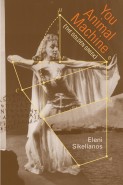
Book Review: You Animal Machine (The Golden Greek) by Eleni Sikelianos
You Animal Machine (The Golden Greek)
Essay by Eleni Sikelianos
Coffee House Press, June 2014
ISBN-13: 978-1566893602
$16.95; 152pp.
Reviewed by Ann Beman
With her latest book, Eleni Sikelianos sashays with the essay, teasing us with the literary device’s exotic form. In the process, the poet exposes the catlike survival instincts of her maternal grandmother Melena, a burlesque dancer known as the Leopard Girl.
From Sikelianos’s collage of poetry, pastiche, and graphic memoir, we learn about the history of exotic dance in America (“a miniature history of the way women are watched”). We learn about Melena’s three daughters and five husbands. The father of her children “was a Jew of Lithuanian or Russian or Polish descent who played jazz bass in Detroit nightclubs.” Next came the petty criminal, followed by the aviator who molested his wife’s daughters, followed by the dwarf who’d nursed a crush on Melena since she was a child. Last but not least came her one real love, an African American preacher whom she left when she moved permanently to California. We also learn that this book is part of a longer family history, “a circulatory system that encompasses morphine and heroin addicts, refugees, Ionian counts, … several poets and lesbians, opium-runners, forgers, waitresses, tavern entertainers, a burlesque dancer … .”
As our lead character, Melena shimmers, mirage-like, first as a catsuit-clad exotic dancer in post-war Middle America, and later as Grandma in her fringe-of-the-Mojave rock shop. The Leopard Girl manifests most clearly when the author interviews Melena’s three daughters, one of whom is the author’s own mother. The dancer also effectively materializes in a scene in which Melena attempts to teach her granddaughter to perform her sinuous moves.
My grandmother teaching me to dance around a coffee table. You move your hips to the drums, she is telling me, your feet to the rest. She’s drunk. We’re having fun in that way you do with someone who might punch you in the teeth at any moment. Like standing at the edge of a dark cliff, below you, the nighttime waters aglow with dense possibility.
Sikelianos effectively employs the artistic concept of negative space to navigate Melena’s life, gleaning as much from what is not there as from the few sketches that exist. In an interview with this reviewer, the author confesses to being “conscious of the way our vision is blocked … [and] being more interested in the ways we don’t see, in blindness, rather than in what we do.” She says, “The shifting forms are a way to see around corners.”
Thus, the author asks this book to fill in variables where concrete particulars are lacking, experimenting with varying forms – scrapbook pages, interviews, conversations with the dead. “I’m trying to make sense for her,” writes Sikelianos, “[to] build her a net that connects to everything, let her slide around in an elegant way in daylight.” Of course, the author acknowledges, a net is by nature full of holes. “It matters that there are holes in a family history that can never be filled, that there are secrets and mysteries, migrations and invasions and murky bloodlines. In this way we speak of human history.”
You Animal Machine follows The Book of Jon, a hybrid work about the author’s father, and in turn will be followed by another simmering family history about the author’s lesbian theater director great-grandmother and the theater director’s husband, the Nobel-nominated Greek poet Angelos Sikelianos. Read the first two before the curtain rises on the third.
Ann Beman has been writing a book about thumbs forever. LAR’s nonfiction editor lives in California’s Sierra Nevada with her husband, two whatchamaterriers and a chihuahua in Kernville, on the Kern River, in Kern County (cue the banjoes).

